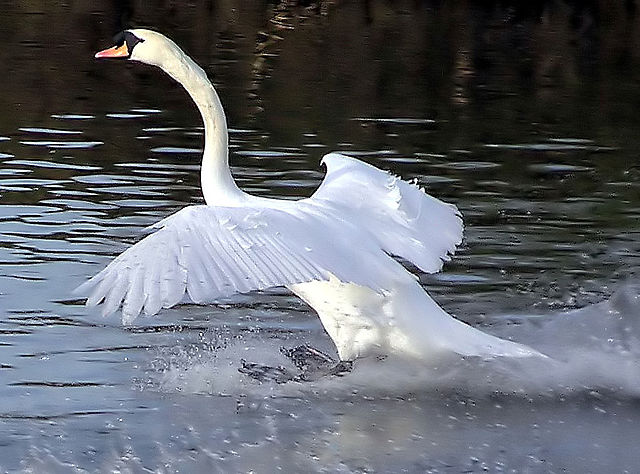Date: Wed 29 May 2013
Matching Commentaries:
Commentary for Exeter Riddle 8
Original text:
Ic þurh muþ sprece mongum reordum,
wrencum singe, wrixle geneahhe
heafodwoþe, hlude cirme,
healde mine wisan, hleoþre ne miþe,
5 eald æfensceop, eorlum bringe
blisse in burgum, þonne ic bugendre
stefne styrme; stille on wicum
sittað nigende. Saga hwæt ic hatte,
þe swa scirenige sceawendwisan
10 hlude onhyrge, hæleþum bodige
wilcumena fela woþe minre.
Translation:
I speak through my mouth with many sounds,
I sing with modulation, frequently vary
my voice, call loudly,
stick to my ways, I do not stifle my speech,
5 an old evening-singer, I bring delight
to dwellers in the cities, when I bellow
with bending voice; still in their homes,
they sit silently. Say what I am called,
who, like an actress, loudly imitates
10 the entertainer’s song, proclaims to people
many greetings with my speaking.
Click to show riddle solution?
Nightingale (likely), Pipe or Flute, all manner of other birds, etc
Notes: This riddle appears on folio 103r of The Exeter Book.
The above Old English text is based on this edition: Elliott van Kirk Dobbie and George Philip Krapp, eds, The Exeter Book, Anglo-Saxon Poetic Records 3 (New York: Columbia University Press, 1936), page 185.
Note that this edition numbers the text Riddle 6: Craig Williamson, ed., The Old English Riddles of the Exeter Book (Chapel Hill: University of North Carolina Press, 1977), page 72.
Tags:
riddle 8
anglo saxon
exeter book
riddles
old english
solutions
Related Posts:
Exeter Riddle 23
Exeter Riddle 24
Exeter Riddle 33



Commentary for Exeter Riddle 5
MATTHIASAMMON
Date: Tue 09 Apr 2013Matching Riddle: Exeter Riddle 5
This riddle is most commonly solved as "shield" and this is the solution I’m adopting here. The shield is one of the most common accessories of the protagonists of heroic poetry (see for example the importance of this piece of battle-equipment in poems like Beowulf or The Battle of Maldon) and as such is one of the most important symbols of this social world. In this riddle, the usual connotations are subverted. While the poem uses the common associations of the shield with swords (ecg, bill) and battle (wig, beadoweorc), the shield is cast in the role of an exile, as suggested by the poetic term anhaga, familiar to readers of Old English poetry from the first line of The Wanderer (Oft him anhaga are gebideð…, "Often the solitary man himself experiences favour…"), a poem which explores the mental landscape of somebody who is no longer a part of the heroic social world (full translation here). It may for example also be considered significant that the shield cannot find any security in the burg, the "stronghold," a word that is etymologically and semantically connected to other words relating to "safety" in Old English.
Here’s a reconstructed Viking shield from the Barrow-in-Furness Dock Museum.
Like the main character of The Wanderer, the shield is unable to do anything about what’s happening to it – note that it talks about the things being done to it, with me as the object of the sentences in the middle of the poem and the final two lines. Where the shield is the subject, the verbs are not ones of action (seo: "I see"; forwurðe: "I perish"; findan meahte: "I might find"). As we have already seen in some of the other riddles, the shield – an inanimate object – speaks in the first person (a literary technique known as "prosopopeia"). Through this, the shield to a certain extent takes on the persona of a human warrior, scarred by many battles and left without companions.
The riddle therefore plays with several aspects of the shield’s identity: it is a heroic object, used in potentially glorious battles, but its essentially defensive nature means it’s less glamorous than an active, attacking weapon like a sword – it has things done to it and can do nothing to change its fate. Like the exiles whose plight is evoked in the Old English elegies, the description of the shield shows what one might call the flipside of the heroic world: the scars, the injuries, the grittiness of battle, the potential for the individual to be left without help or companionship.
Related Posts:
Exeter Riddle 5